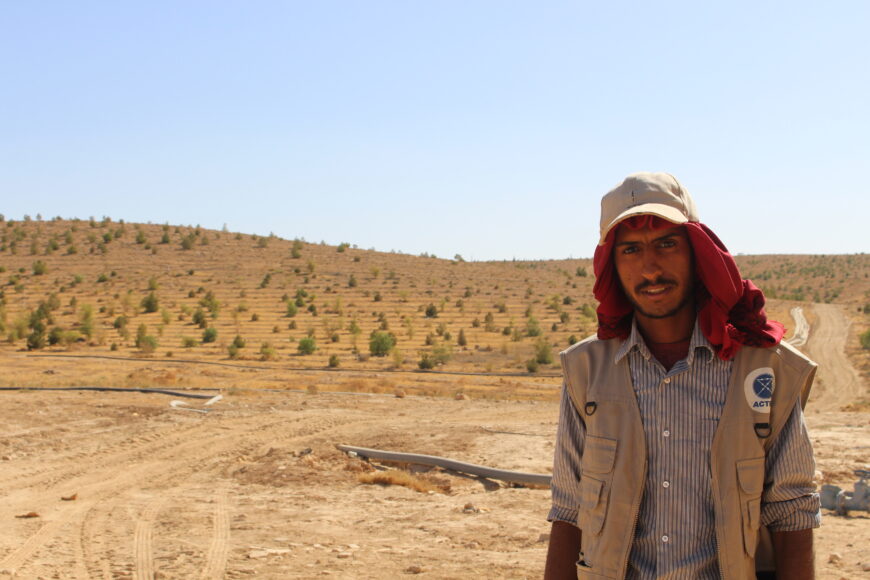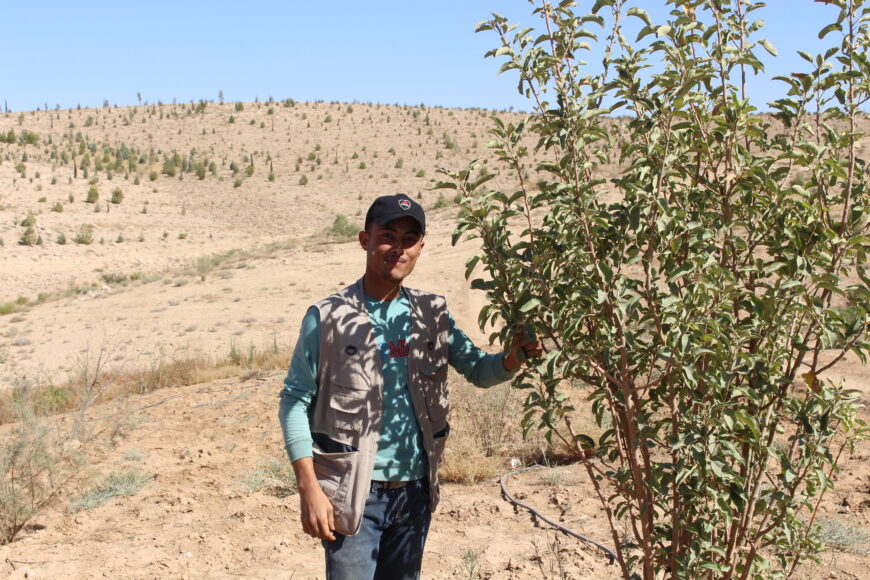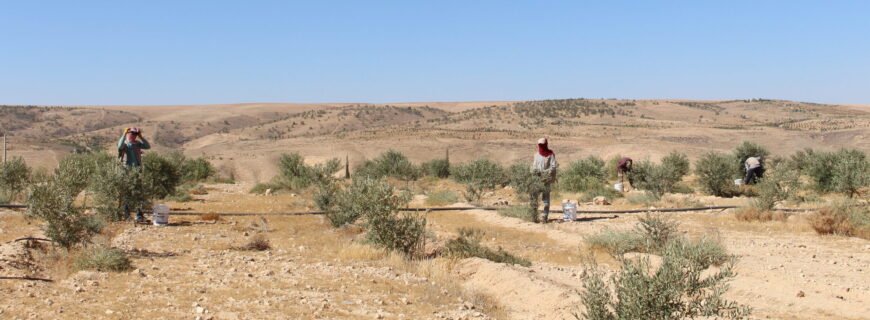Jordan, where the climate is dry most of the year, is highly impacted by climate change, which is exacerbating water scarcity and desertification. To counter this impact, Acted is engaging a group of 50 vulnerable Jordanians and Syrian refugees to work on the arid landscape of the Karak governorate. As such, the equivalent of 700 hectares of land are being regenerated and maintained to increase forestry regeneration in the Jothur Reserve, notably through the planting of 132,000 forest trees.
More than 10 years into the Syrian crisis, Syrian refugees registered in Jordan are still facing integration difficulties. They are, for example, still struggling to gain access to employment. Approximately 64% of them are living under the poverty line (UNHCR, 2022), and are facing challenges to access formal employment opportunities, preventing them from integrating into the Jordanian society and meeting their basic needs. On the other hand, the already fragile Jordanian job market remains heavily impacted by the Covid pandemic, with an unemployment rate of almost 24% in 2022 (World Bank). The lack of job opportunities in turn affects access to basic needs, with 14% of the Jordan population living below the poverty line that same year. These challenges are even greater for the youth, who is facing an unemployment rate close to 50%, hampering the economic growth of Jordan and the development of opportunities that would enable the next generation to get out of poverty. Yousef* is a 21-year-old Jordanian, and Hassan* is a 20-year-old Syrian refugee. They work together as part of Acted’s sustainable forestation programme in Karak, which is directly fighting against the desertification of the area, reducing land degradation and improving the living conditions of vulnerable Jordanians and Syrian refugees in the governorate. This project started in September 2022 and will continue until May 2024, thanks to generous funding from GIZ.

Creating income opportunities and building relationships
Yousef used to work as a daily labourer in the agricultural sector. His income was uncertain and he struggled to earn a stable living from this activity. In Jordan, daily workers are particularly vulnerable as they work in difficult conditions for low wages and have no job security, preventing them from saving money or making plans for the future. Yousef found out about the project when it had already started, but he could still be interviewed before the end of the hiring process. He saw this programme as an opportunity to have a reliable income and decent working conditions, enabling him to make a living and save money. When discussing with programme teams, Yousef gladly shared that through the project, he also developed meaningful relationships with both Jordanian and Syrian colleagues. He explained that this represents an additional incentive for him to come to work every day. To a broader scale, this cohesion contributes to building social cohesion between Syrian and Jordanian communities in the area.
A chance to start a new life in Jordan
Hassan is only 20, but he has already overcome many challenges. He flew from Syria due to the conflict, and finished his education in Jordan, where he obtained his Al-Tawjihi certification (the General Secondary Education Certificate Examination in Jordan and Palestine, giving access to universities). Hassan had always dreamt of becoming a journalist but did not have the financial means to enroll in university after graduation. Therefore, he applied for the Albert Einstein German Academic Refugee Initiative scholarship offered by UNHCR to refugees wishing to pursue higher education. Unfortunately, Hassan was not one of the 25 students selected for the grant. Yet, Hassan clung to his dream, and decided to work until he could raise enough money to complete his studies in the Department of Journalism and Mass Communications. Therefore, when he received a link to Acted’s job offer for this forestation project, he decided to apply, even though he already had a night job. The works consist in planting trees and shrubs in the reserve, pruning, tree curling, maintaining irrigation systems, removing plants deposit and fencing, for up to 60 working days per worker. Thanks to these two jobs and his strong determination, Hassan has raised enough money to be able to enroll in university for the coming year.
Working on this project is helping me to complete my university studies.

Working to earn a living, but also to contribute to a meaningful project
Yousef and Hassan both joined the project for economic reasons, as it enables them to sustainably improve their living conditions. However, their motivation to engage now goes beyond that. Both explain they feel proud to be involved in an action that will have long term effects on Karak’s territory and landscape. Indeed, while 90% of Jordan is already considered as dryland (Ministry of Environment, IUCN and GEF, 2020), the situation keeps deteriorating due to climate change, limited water supply and population pressure, leading to increased deforestation and land degradation. These phenomena in turn have negative impacts on the neighbouring communities’ health and food security, and harm their living conditions and agricultural capacities.
This project participated in improving my knowledge and experience on agricultural practices based on scientific evidence. I hope that we can spread the idea of this project across all governorates.

The planted trees are a mix of native forest and productive trees chosen according to the specificities of the soil. In addition, climate smart techniques such as natural rainwater harvesting, are used to ensure the sustainability of the project and long-term development of the planted trees. Both Yousef and Hassan mentioned looking forward to the long-term results of the project, as they could see that the trees, although small, have already transformed the desert-looking landscape of the area into green hills, where Hassan predicts families and tourists will soon be coming to visit to see the beautiful scenery.
Through an act as simple as planting trees, Yousef and Hassan have developed skills, friendships, and income, while participating in the improvement of the living conditions of the communities living around the Jothur Reserve in the Karak Governorate. Both can now look to the future with more serenity, as their active participation in the project provides them with stability and helps them to be more employable in the future.
*name has been changed to protect privacy.